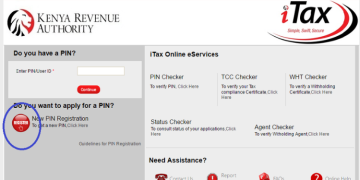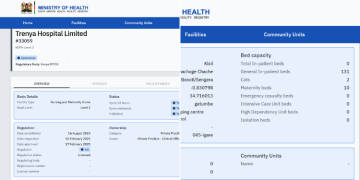Households and businesses often turn to bank loans for financial support to meet various needs—whether it’s paying school fees, buying a car, expanding a business, or owning a home.
A loan is the sum of an amount of money that an individual or a group of people borrow from someone or a financial institution and is repaid with interest.
The lender allows the borrower to use the funds in exchange for an agreed interest rate. People borrow loans to meet their financial needs.
However, choosing the right loan can be challenging if you don’t understand how each one works.
At the same time, accessing a loan isn’t always easy. Some people are locked out by strict requirements, while others take loans they cannot afford to repay.
Whether you’re an individual or a business owner, understanding these loan options can help you make informed choices based on your needs and financial situation.
Each loan is tailored for a specific purpose.
Types of Bank Loans You Can Apply for in Kenya
1. Personal Loans
These are loans offered to individuals to cater for personal needs such as school fees, medical expenses, or emergencies.
Personal loans can either be secured (which means you need collateral) or unsecured where no collateral is needed.
They have a set repayment period with consistent monthly payments. Personal loans typically tend to be short term loans. However, depending on the amount, some can be long term loans.
They’re flexible but often expensive.
- How it works: You borrow a fixed amount and repay it in monthly installments with interest.
- Requirement: Proof of income (like a payslip or bank statement) and a good credit(repayment) history.
Some of these loans are repaid directly through your salary, which makes them easier to manage—but also easy to overuse if not handled carefully.
Also Read: KCB Reduces Interest Rates on New and Existing Loans
2. Business Loan
Business loans are offered by banks and financial institutions to support the growth and operations of businesses.
These loans support SMEs, startups, and large enterprises by funding working capital, expansion, equipment purchases, or real estate investments.
They are repaid over an agreed period, with interest, and may require collateral depending on the lender’s terms. Interest rates vary based on several factors, including the size of the business and the loan amount.
Business loans can be used for a variety of purposes—such as boosting capital, managing cash flow, or funding expansion plans.
Maintaining good financial records and practicing sound money management can improve your business credit score, increasing your chances of loan approval.
Common types of business loans in Kenya include:
- Term Loans
Term loans are borrowed for a specific amount and repaid over a fixed period, usually with monthly installments.
They can be short-term (up to 12 months), medium-term (1–5 years), or long-term (over 5 years).
- Working Capital Loans
These are short-term loans meant to help businesses manage daily operations and cash flow—such as paying salaries, rent, or utilities. They’re useful when a business is waiting for payments from clients or facing a temporary cash shortage.
- Micro Loans
Micro loans are small amounts of money given to small businesses or start-ups that may not qualify for larger loans.
- Asset Financing
This loan helps businesses acquire assets like vehicles, machinery, or equipment. The asset being purchased often acts as the security for the loan.
Also Read: CBK Explains Why Company Bank Loans Have Increased in 2025
3. Mortgage loans
Mortgage loans are used for buying or building a home, financing the purchase, construction, or renovation of residential or commercial properties, including affordable housing initiatives.
The person borrowing the money agrees to pay the lender within a specified time and the property acts as the collateral.
Mortgage rates vary depending on the type of property being purchased and the qualifications of the person applying for the loan.
These loans typically require longer repayment periods and substantial paperwork.
4. Salary Advance Loans
This is a short-term loan that one repays when they receive their paycheck. It is usually repaid in a single payment.
It is offered to account holders who are salaried employees and get paid through the same bank.
Your monthly salary acts as the security for this type of loan, making it quick and easy to access during emergencies or financial shortfalls before payday.
5. Asset Finance loans
Asset financing refers to loans used to purchase movable assets such as vehicles, motorcycles, heavy machinery, pick-ups, and tractors.
These loans typically come with fixed interest rates and repayment periods that depend on the loan amount.
Asset financing helps borrowers conserve cash by allowing them to acquire assets through a simple and quick process.
It also offers flexibility, as the borrower can use the asset while repaying the loan.
The asset itself acts as collateral, and full ownership is transferred to the borrower once the loan is fully repaid.
Before taking a loan, be sure to take your time to understand the terms of that loan to avoid issues later.
You should understand that different loan options come with different terms and conditions.
Follow our WhatsApp Channel and X Account for real-time news updates.
































![Understanding Endometriosis: Expert Breaks Down Causes, Symptoms And Treatment [Video] Dr. Joseph Njagi, A Renowned Endometriosis Specialist A Surgeon, Says That Period Pain Among Girls And Women Should Not Be Ignored As A Normal Thing, As It May Signal A Symptom Of Endometriosis]( https://thekenyatimescdn-ese7d3e7ghdnbfa9.z01.azurefd.net/prodimages/uploads/2025/08/Dr-Joe-Njagi-together-with-his-team-of-Doctors-in-a-theatre-room-360x180.png)














































